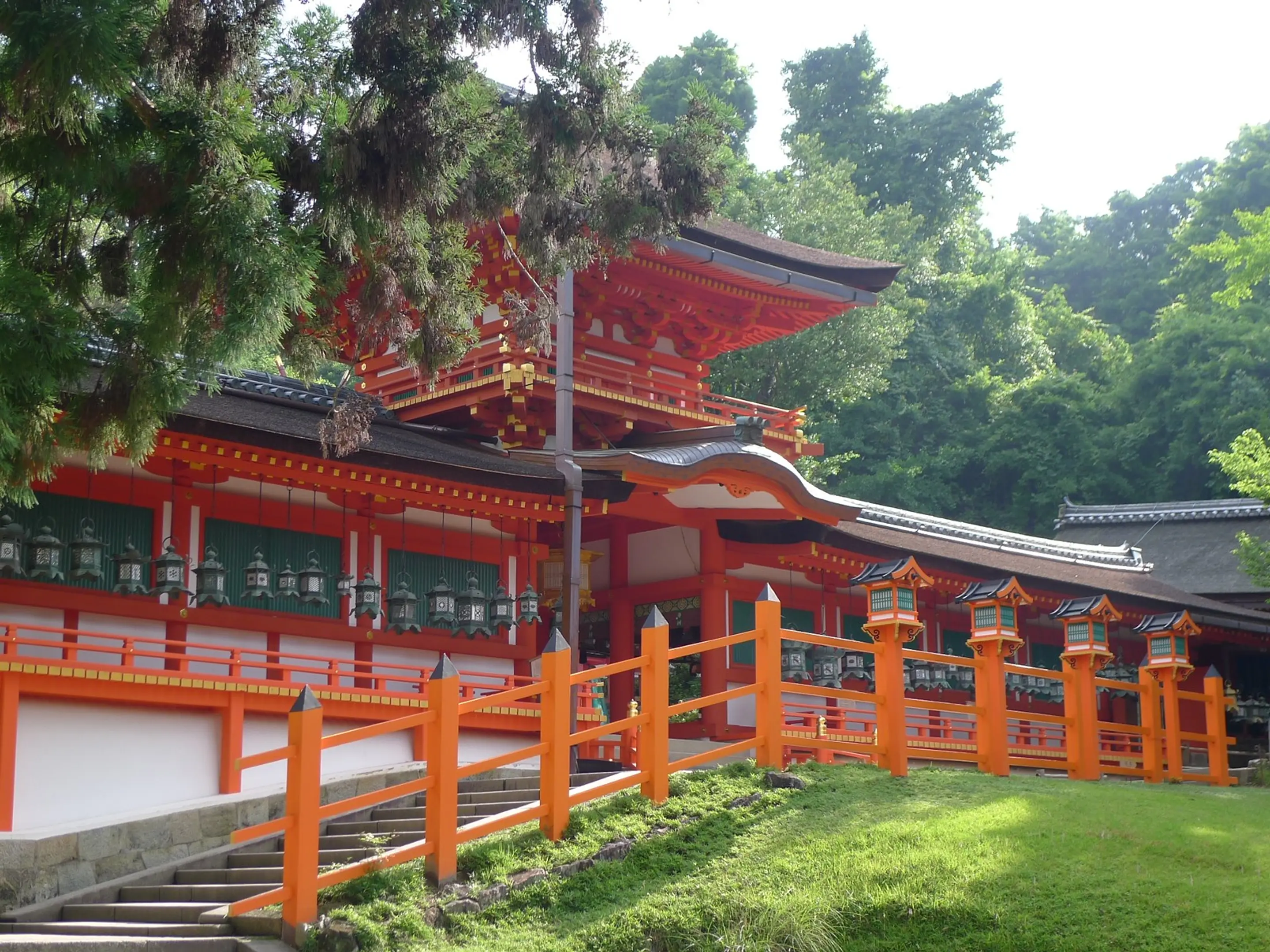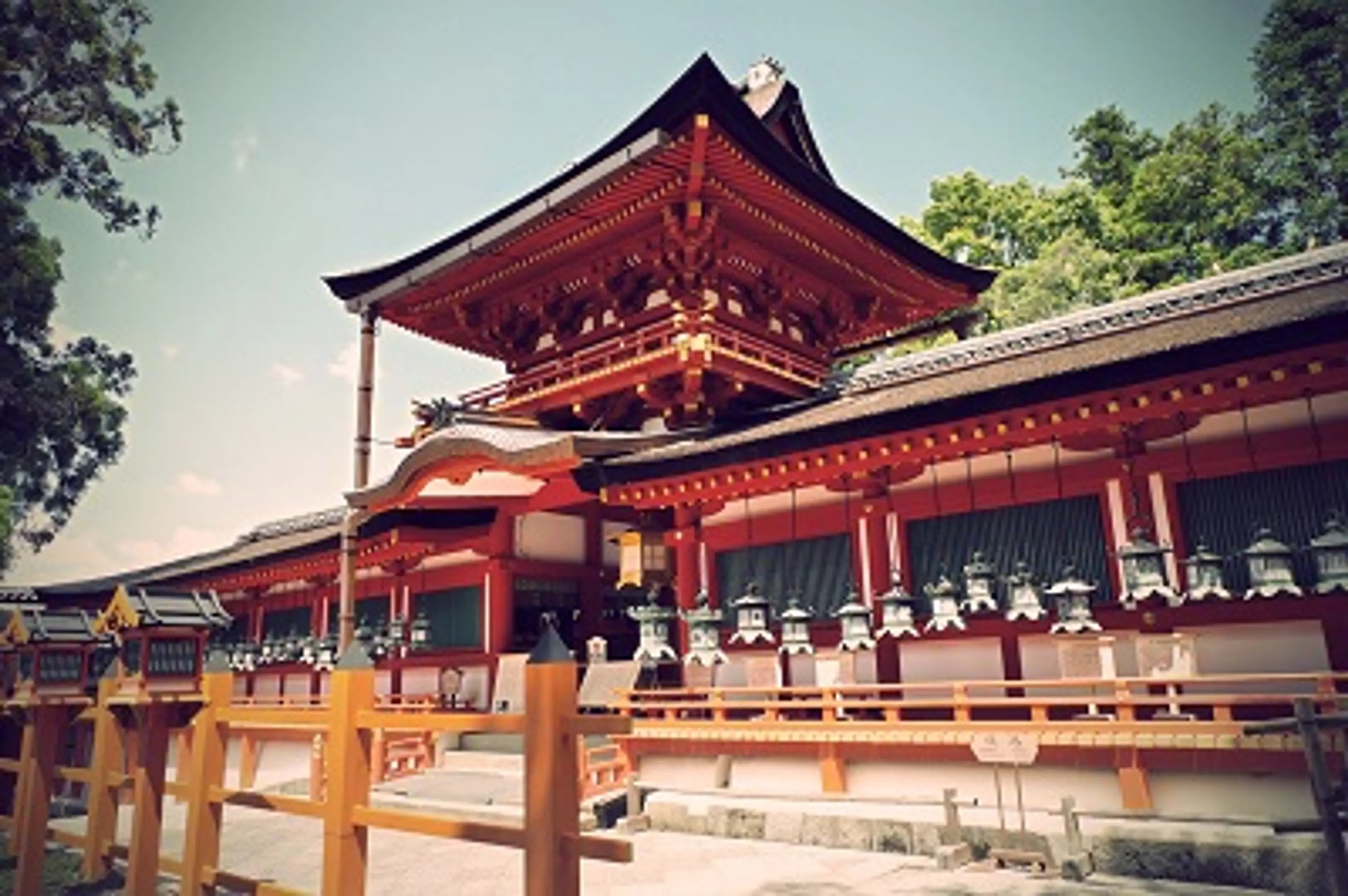Kasugataisha Shrine
The Shrine lies in a primeval forest of cedars and a kind of Chinese black pines. The brilliant vermillon edifices are beautifully contrasted with their surrounding greenery. Going through the first and second Torii gates, you can see a lot of stone lanterns standing on both sides of the approach to the shrine. Going on further, you will find the south gate on the left. The main hall is located among trees behind the gate. From the gate a corridor extends to the left and to the right. A great number of lanterns hung from the eaves of the corridor are producing an elegant atmosphere. In the 3rd year of the Wado era (710), when the capital was transferred to Nara, Fujiwara-no-Fuhito celebrated a mass for tutelary deities of the Fujiwara family, which is considered to be the origin of this shrine. In the 2nd year of the Jingo-Keiun era (768), shrine buildings started to be constructed here. Just like the Kofuku-ji Temple,shrine buildings were added, along with the prosperity of the Fujiwara family. In the first half of the Heian period (794-1192), shrine buildings were completed on the same scale as they are today. After the Middle Ages, the belief was prevalent among commoners, which is shown by the fact that various-shaped hanging lanterns and stone lanterns known as "Mantoro" were mostly the donations from common people. The tutelary deities enshrined here are Takemikazuchi-no-Mikoto from Kashima of Ibaraki Prefecture, Futsunushi-no-Mikoto from Katori of Chiba Prefecture, Amenokoyane-no-Mikoto and Himegami from Hiraoka of Osaka Prefecture. (10 minutes' walk from the bus stop Kasuga Taisha Omote Sando of Loop Line Bus of the city)
Detailed information
| Address | 160 Kasugano-cho, Nara City 630-8212 |
|---|---|
| Opening Hours | Opening Hours: April-September: 6:00 a.m. - 6:00 p.m. October-March: 6:30 a.m. - 5:00 p.m. Treasure Hall: 9:00 a.m. - 5:00 p.m. (Last entry at 4:30 p.m.) Kasuga Taisha Shrine Manyo Botanical Garden March-October: 9:00 a.m. - 4:30 p.m. (Doors close at 5:00 p.m.) November-February: 9:00 a.m. - 4:00 p.m. (Doors close at 4:30 p.m.) |
| Closed day | Treasure Hall: Closed except during three annual special exhibitions. Kasuga Taisha Shrine Manyo Botancial Garden March-November: Always open December-February: Closed on Mondays (Should national holidays fall on a Monday, the garden will be closed the following day) |
| Parking | 100 cars available
|
| Price | Free access to the grounds Special visit to the corridor: 500 yen National Treasure Hall Adults: 500 yen University: 300 yen High school: 300 yen Junior high school: 200 yen Elementary school: 200 yen Kasuga Taisha Manyo Botanical Garden (Shinen) Adults: 500 yen Children: 250 yen |
| Price (Group) | Group rates apply: 20 or more people National Treasure Hall Adults: 400 yen Kasuga Taisha Manyo Botanical Garden (Shinen) Adults: 400 yen Children: 200 yen |
| Inquiry | Tel: +81-742-22-7788 Fax: 0742-27-2114 |
| Events | Rice-transplanting Festival (Rice- transplanting Shinto ritual): Mar.15 11:00~ TAKIGI-NOH(Firelight Noh): the 3 rd Friday and Saturday of May Mantoro: February Setsubun 18:00~20:30 MAN-TORO (Ten-thousand Lantern Festival): 8月14・15日19 :00~21:30 Kasuga Wakamiya Festival: Dec. 15,16,17,18 |
| Flower-Viewing | Camellia, Japanese Andromeda, Wisteria |
| National Treasures | 4 main buildings of shrine and others |
| Remarks | Audio information Annual lectures are held from January to March with the title of, ""Studying the Traditions of Japan as a Shrine Maiden. |
| Access & Bus Stop |
8 minutes by bus from JR Nara and Kintetsu Nara Stations. Immediately in front of the last stop on the bus to "Kasuga Taisha Honden." Alternatively, 8 minutes on the city loop bus. Walk ten minutes from "Kasuga Taisha Omotesando" bus stop.
JR Nara Station Bus Terminal East Gate Bus Stop No.②
Kintetsu Nara Station Bus Terminal Bus Stop No.①
|



